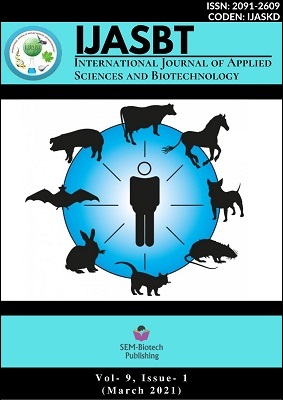The Characterization and Microbiological Evaluation of Probiotic Isolated from Bambara Groundnut
DOI:
https://doi.org/10.3126/ijasbt.v9i1.32959Keywords:
Lactic acid bacteria, Bambara groundnut, fermentation, probiotic, isolates, neutraceuticsAbstract
The study was carried out to isolate, characterize, and study antimicrobial sensitivity of lactic acid bacteria (LAB) from Bambara groundnut. Dried Bambara groundnut was fermented by spontaneous method for seven days and its pH, TTA (Total Titratable acidity) and microbial load monitored for each of the fermentation days. Seven acid-producing cultures were isolated from the sample, and isolates were further classified first by phenotype. Phenotypic and biochemical characteristics led to identification of three bacterial groups. These were followed by in vitro assessment of antimicrobial activity against enteropathogenic bacteria. The most abundant type of LAB distributed in the isolates of fermented Bambara groundnut was Lactobacillus delbrueckii, followed by Lactobacillus casei in two of the isolates. Lactobacillus brevis was found in the remaining two isolates. The growth pattern at different salt concentrations revealed that the isolates were salt tolerant at 2% and 4% while at 6.5% there was no growth. At pH 4.5 and 6.0, there were also growth. The strain evaluated showed in vitro antibacterial activity against five pathogenic microorganisms namely Escherichia coli, Salmonella sp, Shigella sp, Pseudomonas sp and Staphylococcus sp using agar well diffusion method. These results suggested that various LAB were present in Bambara groundnut. The microorganisms isolated were then freeze dried using a freeze drier and then kept at a low temperature in the refrigerator so as to preserve/store the organisms for further processes. This report thereby showed that Bambara groundnut, being an underutilized legume can serve as potential candidate for probiotic neutraceuticals.
Int. J. Appl. Sci. Biotechnol. Vol 9(1): 54-64




